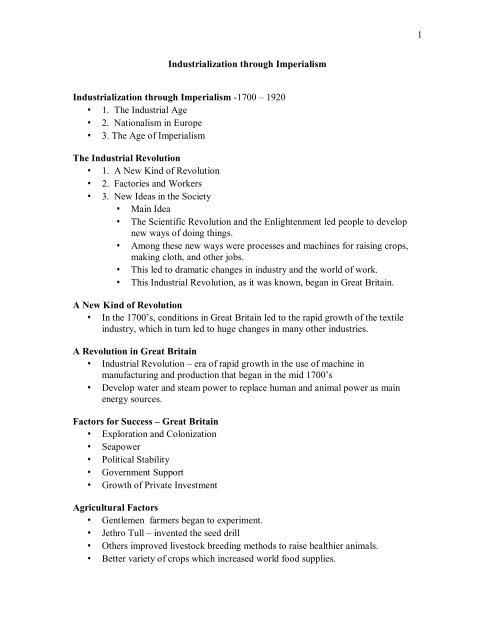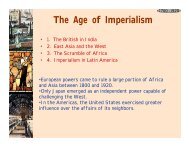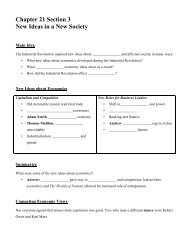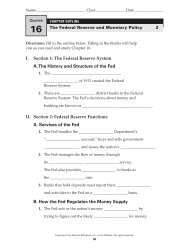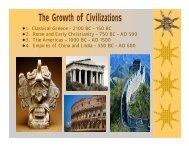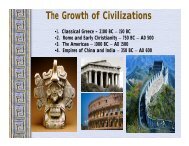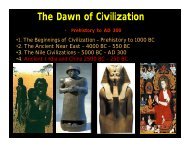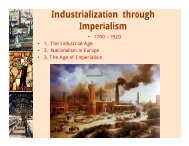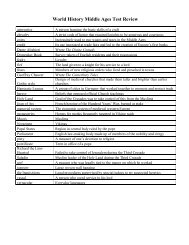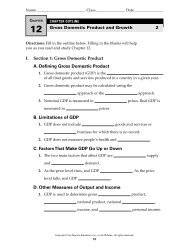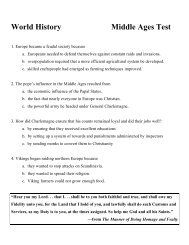Industrialization and Nationalism Unit Notes
Industrialization and Nationalism Unit Notes
Industrialization and Nationalism Unit Notes
You also want an ePaper? Increase the reach of your titles
YUMPU automatically turns print PDFs into web optimized ePapers that Google loves.
1<br />
<strong>Industrialization</strong> through Imperialism<br />
<strong>Industrialization</strong> through Imperialism -1700 – 1920<br />
• 1. The Industrial Age<br />
• 2. <strong>Nationalism</strong> in Europe<br />
• 3. The Age of Imperialism<br />
The Industrial Revolution<br />
• 1. A New Kind of Revolution<br />
• 2. Factories <strong>and</strong> Workers<br />
• 3. New Ideas in the Society<br />
• Main Idea<br />
• The Scientific Revolution <strong>and</strong> the Enlightenment led people to develop<br />
new ways of doing things.<br />
• Among these new ways were processes <strong>and</strong> machines for raising crops,<br />
making cloth, <strong>and</strong> other jobs.<br />
• This led to dramatic changes in industry <strong>and</strong> the world of work.<br />
• This Industrial Revolution, as it was known, began in Great Britain.<br />
A New Kind of Revolution<br />
• In the 1700’s, conditions in Great Britain led to the rapid growth of the textile<br />
industry, which in turn led to huge changes in many other industries.<br />
A Revolution in Great Britain<br />
• Industrial Revolution – era of rapid growth in the use of machine in<br />
manufacturing <strong>and</strong> production that began in the mid 1700’s<br />
• Develop water <strong>and</strong> steam power to replace human <strong>and</strong> animal power as main<br />
energy sources.<br />
Factors for Success – Great Britain<br />
• Exploration <strong>and</strong> Colonization<br />
• Seapower<br />
• Political Stability<br />
• Government Support<br />
• Growth of Private Investment<br />
Agricultural Factors<br />
• Gentlemen farmers began to experiment.<br />
• Jethro Tull – invented the seed drill<br />
• Others improved livestock breeding methods to raise healthier animals.<br />
• Better variety of crops which increased world food supplies.
2<br />
• Enclosure movement – allowed for more efficient farming methods <strong>and</strong> increased<br />
food supply – large fenced in farms<br />
Britain’s Big Advantage<br />
• Great Britain had all the essential elements that a nation needed to achieve<br />
economic success.<br />
• Factors of Production – l<strong>and</strong>, labor, <strong>and</strong> capital<br />
A Revolution in Textiles<br />
• Cottage industry – a craft occupation performed in the home<br />
• Weaving – cottage industry – began the Industrial Revolution (cloth making or<br />
textiles)<br />
• <strong>Industrialization</strong> – process of changing to power driven machinery<br />
A New Way of Cloth<br />
• An influx of cotton from the Americas due to the slave labor in the southern<br />
states.<br />
• As Great Britain needed more cotton, slavery became even more entrenched<br />
(economic reason that led to civil war)<br />
• Eli Whitney – Cotton Gin<br />
• Richard Arkwright – Spinning Frame – used to spin stronger, thinner thread<br />
• New Machines were far to big to remain in cottages <strong>and</strong> it led to factories – a<br />
building that housed industrial machines<br />
Steam Power for Revolution<br />
• Physics – when water is heated <strong>and</strong> changed into steam, it exp<strong>and</strong>s.<br />
• Use steam to harness power to drive machines – changed the world<br />
The Steam Engine<br />
• Engl<strong>and</strong> – 1712 – James Watt –first steam engine to drive machinery<br />
• Led to a power source for ships –Robert Fulton – the first steam engine ship –<br />
Clermont<br />
• Used on the Hudson River – Albany to NYC<br />
Coal for British Steam Engines<br />
• Early steam was fueled by burning wood from Engl<strong>and</strong>’s forest<br />
• New fuel – coal – the increase in factories built to run on steam led to a coal<br />
mining industry in Engl<strong>and</strong> – produced 80% of Europe’s coal<br />
Industrialism Spreads<br />
• <strong>Industrialization</strong> increased rapidly <strong>and</strong> spread to Western Europe <strong>and</strong> the <strong>Unit</strong>ed<br />
States.<br />
• Asia <strong>and</strong> Africa – industrialized in 1800’s during age of imperialism
3<br />
• Individual freedom on economic activity led to increased industrialization in<br />
Western Europe.<br />
Industry Comes to America<br />
• The <strong>Unit</strong>ed States, because of its economic relationship with Great Britain, was<br />
one of the first to benefit from Engl<strong>and</strong>’s industrialization.<br />
• Alex<strong>and</strong>er Hamilton – Secretary of Treasury under George Washington – argued<br />
that industrialization would help the <strong>Unit</strong>ed States.<br />
• Samuel Slater, a highly skilled mill worker from Great Britain, traveled to the<br />
<strong>Unit</strong>ed States to make a fortune.<br />
• Textile mill industry spread throughout northeast <strong>Unit</strong>ed States – Lowell mills<br />
Industry Spreads to Europe<br />
• William Cockerill, an engineer from Great Britain brought industry to continental<br />
Europe.<br />
• Went to Belgium, which was the second industrialized nation to develop in<br />
Europe.<br />
• Delayed in France (French Revolution <strong>and</strong> Napoleonic Wars) <strong>and</strong> in Germany (no<br />
central government)<br />
Industry in Asia<br />
• Eventually industrialization spread to Asia.<br />
• Came to Japan fairly late, but today Japan is one of the world’s industrial leaders.<br />
Factories <strong>and</strong> Workers<br />
The transition from cottage industries changed how people worked in factories,<br />
what life was like in factories, <strong>and</strong> labor conditions in the factories.<br />
Production before Factories<br />
• Production began with the cottages <strong>and</strong> increased due to the factories.<br />
Cottage Industries<br />
• Benefits – controlled work schedule, product quality guaranteed, made own<br />
decisions, <strong>and</strong> created own work season.<br />
• Disadvantages – fire or floods in your home caused from machines, homes are too<br />
small,<br />
• As a result moves towards factories, which in turn led to factory towns<br />
Factories <strong>and</strong> Factory Towns<br />
• A factory laborer had to leave his or her home <strong>and</strong> work in place built especially<br />
for an industry.<br />
• Meant support for the family, but caused real hardship.<br />
• Working in the Factory –<br />
• Divided into several separate, easily learned tasks
4<br />
• Children worked in the factories to help with expenses<br />
• Working conditions were very poor - lack of ventilation, poor sanitation<br />
• Long hours, little pay<br />
• Public recognized need to improve working conditions<br />
Life in Factory Towns<br />
• Factories changed not only the lives of the workers, but also towns where they<br />
were located.<br />
• Early towns centered around rivers to harness power for the steam engines; also<br />
centered around coal mines<br />
• This in turn led to unsanitary living conditions in the towns – overpopulated <strong>and</strong><br />
pollution – which led to a need to improve cities<br />
The Factory System <strong>and</strong> Workers<br />
• Factories changed transformed the nature of labor.<br />
• Factories required large amounts of capital – money to pay for building the<br />
buildings<br />
• Led to wealthy people investing in business or industries to make profits.<br />
Cottage Workers’ Unrest<br />
• Faced a particular challenge caused by the factory system.<br />
• Cottage workers could not compete with factories, <strong>and</strong> facing ruins, some of these<br />
workers turned to violence.<br />
• Luddites Movement – people who resisted using the day’s technologies because it<br />
put them out of work<br />
Changing Working Conditions<br />
• The British government took a h<strong>and</strong>s off approach to the workers unrest <strong>and</strong> did<br />
nothing to regulate business.<br />
• Because government took no action, this led to labor unions – organizations that<br />
represent workers’ interests<br />
• To urge employers to create better working conditions, less hours, higher pay,<br />
they turned to strikes – work stoppages<br />
• Parliament got involved <strong>and</strong> eventually banned unions <strong>and</strong> strikes, but did pass<br />
laws to protect worker’s interests.<br />
A New Class of Workers<br />
• Factor work led to the growth of the middle class.<br />
• Managers <strong>and</strong> accountants kept the factories running <strong>and</strong> their books balanced.<br />
Engineers designed the machines <strong>and</strong> maintained them.<br />
Factories <strong>and</strong> Mass Production<br />
• Factories changed the world of work <strong>and</strong> led to a massive increase in production.
5<br />
• Mass Production – system of manufacturing large numbers of identical items.<br />
• Interchangeable parts – identical machine made parts – mad e production <strong>and</strong><br />
repair more efficient.<br />
• Assembly Line – Product moves from worker to worker, as each one performs a<br />
step in the manufacturing process.<br />
Effects of Mass Production<br />
• Advantages – dramatic increase in production<br />
• Disadvantage – led to repetitious jobs<br />
• Factory work became the norm in manufacturing.<br />
New Ideas in a New Society<br />
The Industrial Revolution inspired new ideas about economic <strong>and</strong> affected society<br />
in many ways.<br />
New Ideas about Economics<br />
• 1700’ <strong>and</strong> 1800’s - industrialization changed not only the way people lived, but<br />
also they way people thought about making money.<br />
• MERCANTILISM<br />
New Roles for Business Leaders<br />
• Capitalism – thrives in Engl<strong>and</strong> <strong>and</strong> led to theory that government should not<br />
interfere.<br />
• Laissez-faire – little government interference in a nation’s economy.<br />
• Adam Smith – The Wealth of Nations - markets free from government<br />
interference benefited all.<br />
• Thomas Malthus – population growth caused by the development of industry<br />
• Entrepreneur – someone who starts a new business<br />
– Andrew Carnegie – American steel industry<br />
– Cornelius V<strong>and</strong>erbilt – Railroad industry<br />
– John D. Rockefeller – St<strong>and</strong>ard Oil<br />
Competing Economic Views<br />
• Not everyone agreed that capitalism was the best economic system<br />
• Robert Owen – Socialism – government should own property, not the people<br />
(economic)<br />
• Karl Marx – more radical view – communism – government should own <strong>and</strong><br />
control all factors of production (political)<br />
Effects on Society<br />
• The rise of economic ideas was among the countless effects the industrial<br />
revolution had on society.<br />
• Shift to factory work transformed the everyday lives of men <strong>and</strong> women.
6<br />
• Men had to go to work in the factories, <strong>and</strong> women had to stay home <strong>and</strong> tend to<br />
the children. ‘Separate Spheres”<br />
Effects on Countries<br />
• On a larger scale than home life, the industrial revolution also affected entire<br />
countries.<br />
• Europe –Great Britain, France, <strong>and</strong> Germany –leaders in the global market<br />
• The <strong>Unit</strong>ed States became an industrial super power.<br />
Long-Term Effects on Societies<br />
• Increased st<strong>and</strong>ard of living – level of material comfort for people in<br />
industrialized nations.<br />
Life in the Industrial Age<br />
• 1. Advances in Technology<br />
• 2. Scientific <strong>and</strong> Medical Achievements<br />
• 3. Daily Life in the Late 1800’s<br />
• Main Idea<br />
• During the 1700’s <strong>and</strong> the 1800’s, the Industrial Revolution brought about<br />
much change in the way people worked.<br />
• Many advances were made in technology.<br />
• This in turn led to a transformation of daily lives throughout the world.<br />
Advances in Technology<br />
• The technological breakthrough of the Industrial Age included advances in<br />
electric power, transportation, <strong>and</strong> communication.<br />
Electric Power<br />
• Before the late 1800’s, water, coal, <strong>and</strong> steam had powered industries.<br />
• One drastic change in industry - electricity<br />
Early Attempts at Electric Power<br />
• Benjamin Franklin – 1700’s – performed experiments with electricity, but could<br />
not harness it<br />
• English chemist – Michael Faraday – discovered the connection between<br />
magnetism <strong>and</strong> electricity. DYNAMO<br />
Edison’s Light bulb<br />
• Thomas Edison – first usable <strong>and</strong> practical light bulb in 1879.<br />
• Menlo Park, New Jersey – group of people inspired by Edison who went to work<br />
for him.<br />
• He also built the world’s first central electric power plant in NYC
7<br />
Effects on Industry <strong>and</strong> Daily Life<br />
• Transformed industry in the <strong>Unit</strong>ed States <strong>and</strong> Europe.<br />
• Three improvements – using electric power replaced steam powered engines - did<br />
not have to depend on waterways – factory production increased because did not<br />
have to depend on sunlight.<br />
• In daily life – oil lamps <strong>and</strong> c<strong>and</strong>les were replaced by electricity – cheaper <strong>and</strong><br />
more efficient<br />
Advances in Transportation<br />
• Improvements were made to transportation.<br />
• Steam-Powered Trains – began to replace steam powered ships as means for long<br />
distance travel – much faster<br />
• Bessemer process – involved forcing air through molten metal to burn out carbon<br />
that make metal brittle. –Production of steel contributed to improvements in<br />
railroad<br />
The Impact of the Railroad<br />
• World’s first railway – linked Manchester <strong>and</strong> Liverpool 1830<br />
Steamships<br />
• Steamships changed ocean travel just like steam railroads changed country or<br />
continent travel.<br />
• 1849 – regular U.S. steamship service<br />
The Automobile<br />
• 1770’s – Europeans seek ways to try to build personal transportation<br />
• German engineers Carl Benz <strong>and</strong> Gottlieb Daimler developed practical<br />
automobiles.<br />
• Internal combustion engine on a horse carriage.<br />
• Only the rich could afford them until . . .<br />
• Henry Ford – 1920 – Model T – assembly car – affordable to the masses<br />
The Airplane<br />
• Advances in transportation were not limited by sea or l<strong>and</strong> – the air – people<br />
wanted to fly.<br />
• Wilbur <strong>and</strong> Orville Wright – succeeded in flying a powered airplane in sustained<br />
flight.<br />
• Went only about 120 feet – eventually the world<br />
Advances in Communication<br />
• 1800’s news travelled slowly throughout the world<br />
• Inventors started to look for better ways to communicate things faster.
8<br />
The Telegraph<br />
• Samuel Morse – telegraph – “What hath God Wrought” – first message<br />
communicated from<br />
• Morse code – a series of short . dit <strong>and</strong> long dah – that represent letters <strong>and</strong><br />
numbers. Washington D.C. to Baltimore MD<br />
• Communication between the <strong>Unit</strong>ed States <strong>and</strong> Europe improved with the laying<br />
of the telegraph cable on the floor of the Atlantic Ocean in 1866.<br />
The Telephone<br />
• Alex<strong>and</strong>er Graham Bell – 1876 – Thomas Watson – created the telephone – heard<br />
a voice through a device’s receiver<br />
• 1900 – 1.5 million telephones in America.<br />
The Radio <strong>and</strong> Phonograph<br />
• Guglielmo Marconi – electromagnetic waves – Italian physicist wireless telegraph<br />
or radio<br />
• Thomas Edison – phonograph – record player<br />
Scientific <strong>and</strong> Medical Achievements<br />
• Advances in Science, medicine, <strong>and</strong> the social sciences led to new theories about<br />
the natural world <strong>and</strong> the human mind, an improved quality of life, <strong>and</strong> longer life<br />
spans.<br />
New Ideas in Science<br />
• Charles Darwin – variations among plants <strong>and</strong> animals –The Origin of Species<br />
Darwin’s Theories<br />
• NATURAL SELECTION – creatures adapting to their environments have a better<br />
chance of surviving to produce offspring<br />
Advances in Chemistry <strong>and</strong> Physics<br />
• 1800’s – chemists <strong>and</strong> physicists discovered that tiny particles, or atoms made up<br />
chemical elements.<br />
• John Dalton – atomic theory<br />
• Dmitri Mendelyev –periodic table of elements<br />
• Marie <strong>and</strong> Pierre Curie – radioactivity – elements that release energy when they<br />
break down<br />
• Ernest Rutherford – center of the atom lay the nucleus<br />
Einstein’s Genius<br />
• 1905 –Jewish German scientist –Albert Einstein – E=MC2 – small amount of<br />
mass can be converted into a great deal of energy.
9<br />
Medical Breakthroughs<br />
• Fundamental concepts of disease, medical care, <strong>and</strong> sanitation were revealed.<br />
Preventing Disease<br />
• 1870 – French chemist – Louis Pasteur – link between microbes <strong>and</strong> disease.<br />
• Pasteurization – destroys bacteria that cause disease by heating<br />
Improving Medical Care<br />
• Anesthetic - drug that reduces pain an in large does make the patient unconscious<br />
– American surgeon Crawford W. Long<br />
• Antiseptic – a germ-killing agent containing carbonic acid – English surgeon<br />
Joseph Lister<br />
• The building of modern hospitals also improved public health.<br />
New Ideas in Social Sciences<br />
• Scientists began to study the mind <strong>and</strong> human societies.<br />
• PHYSCOLOGISTS<br />
• SOCIOLOGISTS<br />
Psychology<br />
• Ivan Pavlov – conditioned reflex – dog experiment<br />
• Sigmund Freud – unconscious part of the mind contains thoughts of which one is<br />
unaware –Id, Super Id, Ego - Psychoanalysis<br />
Other Social Sciences<br />
• Archaeology – the study of the past based on artifacts<br />
• Anthropologists – the study of the past based on human behavior<br />
• Sociology – the study of human behavior<br />
Daily Life in the 1800s<br />
• During the late 1800’s, cities grew <strong>and</strong> changed, while education, leisure time<br />
activities, <strong>and</strong> the arts reflected those changing times.<br />
Cities Grow <strong>and</strong> Change<br />
• Urbanization – the growth in the portion of people living in towns <strong>and</strong> cities.<br />
(transformation)<br />
The Industrial City<br />
• Before the Industrial Age, cities were based on trade, political, military, or<br />
religious functions.<br />
• Factories changed city life.<br />
• One of the first industrial cities – Lowell Massachusetts
10<br />
Migration to Cities<br />
• Between 1870 <strong>and</strong> 1900, almost 12 million people immigrated to the <strong>Unit</strong>ed<br />
States.<br />
• Second wave of immigration – Irel<strong>and</strong>, Engl<strong>and</strong>, Germany, Italy, Russia, <strong>and</strong><br />
China.<br />
The Livable City<br />
• Improvements made in the inner city – sanitation, plumbing, drinking water,<br />
bathtubs, electricity<br />
• City planning – the beautification movement – parks, museums, recreational<br />
facilities<br />
The Suburbs<br />
• As cities grew in population, an outer area began to emerge as the suburbs.<br />
• People moved outside the city because it was less crowded, quieter, <strong>and</strong> cleaner<br />
than the central city.<br />
Education, Leisure, <strong>and</strong> Arts<br />
• With growth of cities in the 1800’s, new educational opportunities developed<br />
along with new sports, other leisure activities, <strong>and</strong> changes in the arts world .<br />
Education <strong>and</strong> Information<br />
• Increased industrialization created a need for a more educated workforce.<br />
• 1870’s – governments in western Europe <strong>and</strong> the <strong>Unit</strong>ed States passed laws<br />
requiring education for many boys, not necessarily girls.<br />
• Newspapers <strong>and</strong> new technology including the linotype machine <strong>and</strong> the electric<br />
press exp<strong>and</strong>ed education <strong>and</strong> led to journalism – up to date coverage <strong>and</strong> current<br />
news reporting<br />
Leisure Time<br />
• Causes of Leisure activities<br />
1. Higher income, more time<br />
2. Public transportation to recreational areas<br />
3. Public funding of cultural activities<br />
• Effects of Leisure activities<br />
1. Time for sports – soccer, rugby, football, baseball<br />
2. More people enjoying vacation spots <strong>and</strong> resorts<br />
3. More opportunities to hear music, enjoy art<br />
Changes in the Arts<br />
• The world of art underwent change as well.<br />
• Artists, writers, <strong>and</strong> musicians developed new styles in response to what was<br />
going on around them<br />
• Romanticism – literary <strong>and</strong> artistic development
11<br />
• William Wordsworth poet of the romanticist era<br />
• Ludwig van Beethoven – composer <strong>and</strong> musician<br />
• Realism – in reaction to romanticism, revealing the world in terms of everyday<br />
life, no matter how unpleasant.<br />
• Charles Dickens – The Christmas Carol<br />
• Leo Tolstoy – War <strong>and</strong> Peace<br />
• Impressionism – French painters introduced a new way of looking at the world –<br />
capture a scene using light, vivid color, <strong>and</strong> motion, rather than just showing its<br />
realistic details.<br />
Reforms, Revolutions, <strong>and</strong> War<br />
• 1. Reforms in the British Empire<br />
• 2. Revolution <strong>and</strong> Change in France<br />
• 3. Independence in Latin America<br />
• 4. Expansion <strong>and</strong> War in the <strong>Unit</strong>ed States<br />
• Main Idea<br />
• Major reforms took place in Europe <strong>and</strong> the Americas during the 1800s.<br />
• Both Great Britain <strong>and</strong> France made democratic reforms.<br />
• Latin American colonies also declared their independence from Europe.<br />
• Lastly, the <strong>Unit</strong>ed States abolished slavery in the Civil War.<br />
Reforms in the British Empire<br />
During the 1800’s, Great Britain passed many democratic reforms that<br />
changed the way people lived <strong>and</strong> worked.<br />
Social <strong>and</strong> Political Reform<br />
• Before the 1800’s, Britain was dominated by the interests of wealthy l<strong>and</strong>owners<br />
<strong>and</strong> aristocrats.<br />
• <strong>Industrialization</strong> led to rapid changes in society.<br />
• British citizens who worked in the industrial world (middle class) but were not<br />
represented in Parliament began to call for social <strong>and</strong> political reform.<br />
Reform Act of 1832<br />
• 1830’s – dem<strong>and</strong>s for reforms became too strong to ignore.<br />
• Reform Act – gave industrial citizens representation in Parliament.<br />
• Gave voting rights to the middle class – increased about 50% (Only men with<br />
property)<br />
Saler <strong>and</strong> the Factory Act<br />
• Michael Sadler – British Parliament – investigated treatment of children in the<br />
factories<br />
• Known as Saler report – showed the harmful conditions of children
12<br />
• Passed the Factory Act of 1833 – limited the working hours of children in textile<br />
industries <strong>and</strong> made it illegal to work longer than a 12 hour day. Children 9 – 13 –<br />
two hours of schooling<br />
Other Reforms<br />
• Social Reforms – abolished slavery in Great Britain<br />
• Passed new public health <strong>and</strong> crime laws to improve living conditions in<br />
industrial cities<br />
Chartism<br />
• Chartists – universal manhood suffrage; voting rights for all men<br />
• They dem<strong>and</strong>ed voting rights <strong>and</strong> the secret ballot.<br />
• Parliament rejected the People’s Charter, which led to Chartist uprisings <strong>and</strong><br />
eventually some Chartist reforms.<br />
Victorian Era Voting Reforms<br />
• In 1837, Queen Victoria became the ruler of Great Britain.<br />
• Her reign was the longest in British history, known as the Victorian Era – time of<br />
great change in Britain, including voting reforms, making Britain increasingly<br />
democratic.<br />
Disraeli <strong>and</strong> Gladstone<br />
1868 – 1885 – prime ministers – Benjamin Disraeli – conservative <strong>and</strong> William<br />
Gladstone – liberal –both elected several times<br />
Voting Rights for Men<br />
• Voting rights in 1867 – bill meant one out of every three men could now vote,<br />
also created the secret ballot.<br />
Women’s Suffrage<br />
• Some members of Parliament pushed for voting rights for women as well.<br />
• Many women thought that getting the right to vote could increase their power in<br />
society.<br />
• Did not receive suffrage until 1918 – Emmeline Pankhurst<br />
• Could not vote until age 30 (1928 same as men)<br />
Changes in the British Empire<br />
• People with in the British Empire – Irel<strong>and</strong>, Canada, Australia, <strong>and</strong> New Zeal<strong>and</strong><br />
took steps to rule themselves.<br />
Irel<strong>and</strong><br />
• Since 1801, Irel<strong>and</strong> was a part of the <strong>Unit</strong>ed Kingdom after the Act of Union<br />
joined Engl<strong>and</strong>, Scotl<strong>and</strong>, <strong>and</strong> Wales.
13<br />
• Mid 1800’s – potato famine wept Irel<strong>and</strong> – 1.5 million migrated to the <strong>Unit</strong>ed<br />
States<br />
• Left Irel<strong>and</strong> resentful of British rule <strong>and</strong> finally 1920, Irel<strong>and</strong> received limited<br />
self-government<br />
Canada<br />
• British colonies in Canada lacked unity due to French colonization.<br />
• 1838 – Lord Durham – British government – form a “great <strong>and</strong> powerful people.<br />
• 1867 – Canada became a dominion, or a self governing colony, first step toward<br />
independence.<br />
Australia <strong>and</strong> New Zeal<strong>and</strong><br />
• 1700’s British sent criminals to Australia, 1800’s – British citizens saw economic<br />
prospects their <strong>and</strong> started settling<br />
• 1901 – Australia – self rule – the Commonwealth<br />
• New Zeal<strong>and</strong> became a dominion as also was the first country to give women the<br />
right to vote.<br />
Revolution <strong>and</strong> Change in France<br />
• During the 1800’s, opposing groups in France struggled to determine what kind of<br />
government France would have – a republic, a constitutional monarchy, or an<br />
absolute monarchy.<br />
The Revolution of 1830<br />
• The Congress of Vienna at the end of the Napoleonic era restored king Louis<br />
XVIII, Louis XVI’s brother, to the French throne.<br />
A King Abdicates<br />
• After the death of King Louis XVIII, his brother, Charles became king.<br />
• He tried to rule as an absolute monarch, but he failed after protestors stormed <strong>and</strong><br />
controlled Paris in the Revolution of 1830.<br />
• Metternich’s reaction - “My life’s work is destroyed.” The reactionary ideas at the<br />
Congress of Vienna were lost.<br />
• Metternich feared that the revolution would spread throughout Europe; his fears<br />
would soon come true.<br />
The Reign of Louis Philippe<br />
• Constitutional monarchy restored under Louis Phillipe.<br />
• He was quite popular with the middle class.<br />
• Referred to as the “citizen king.” However, as king he increasingly abused his<br />
powers <strong>and</strong> an economic depression led France into another revolution.
14<br />
The Birth of Republic<br />
• Economic troubles <strong>and</strong> general unhappiness simmered in France until 1848.<br />
• Revolution sprang once again <strong>and</strong> another republic was born.<br />
The Revolution of 1848<br />
• Began when the French government banned a banquet planned by reformers.<br />
• Angry protestors took the streets <strong>and</strong> King Louis Phillipe abdicated his throne<br />
<strong>and</strong> the monarchy came to an end.<br />
• The French citizens formed a new government, a republic headed by a president.<br />
• Louis Napoleon, the nephew of Napoleon, was elected president. (known as the<br />
Second Republic)<br />
• The First Republic existed during the years between the French Revolution <strong>and</strong><br />
the reign of Napoleon.<br />
Napoleon III <strong>and</strong> the Second Empire<br />
• Under the new constitution, the president could only serve for four years.<br />
• Napoleon, who loved the power, sent troops to power <strong>and</strong> arrested members of<br />
the National Assembly who opposed him.<br />
• He called for a national vote to decide if he should remain in office <strong>and</strong> draft a<br />
new constitution; the people agreed <strong>and</strong> the Second Empire of France had begun.<br />
• Reforms - increasing voting rights, built many miles of railroads, increased trade,<br />
<strong>and</strong> improved communications in France - but ruled with ABSOLUTE power.<br />
The Third Republic<br />
• In 1870, Napoleon III drew France into war with Prussia.<br />
• Napoleon was defeated <strong>and</strong> force to surrender. As a result the French Assembly<br />
deposed Napoleon <strong>and</strong> formed the Third Republic.<br />
• Reforms - made primary education available for children between the ages of 6<br />
<strong>and</strong> 13. Trade Unions were legalized, <strong>and</strong> working hours reduced.<br />
• Workers were granted to one day off a week.<br />
The Dreyfus Affair<br />
• Reforms did not affect everyone in French society.<br />
• Dreyfus affair - revealed the extent of anti-Semitism, or prejudice of Jews in<br />
France.<br />
• A Jewish captain in the French army was falsely accused of given secrets to<br />
Germany.<br />
• This affair divided the country.<br />
• Theodor Herzl - Hungarian born Jew - The Jewish State - plans for an<br />
independent Jewish country - led to Zionism , a Jewish nationalist movement to<br />
re-create a Jewish state in its original homel<strong>and</strong>.
15<br />
Independence in Latin America<br />
• Revolutionary ideas took hold in Latin America as colonies fought for<br />
independence from Europe.<br />
Early Struggles in Latin America<br />
• Early 1800’s - growing tensions among the different ethnic groups of Latin<br />
America were leading to dem<strong>and</strong>s for change.<br />
• The American <strong>and</strong> French Revolution had inspired some Latin America countries<br />
to seek freedom.<br />
Haiti Becomes Independent<br />
• First Latin American territory to break its ties with Europe (France) was Saint<br />
Domingue, located on the western half of the Caribbean isl<strong>and</strong> of Hispaniola.<br />
• Toussaint L’Ouverture, a former enslaved African, led a group of mulattoes <strong>and</strong><br />
slaves in a bloody revolt against the French settlers.<br />
• Napoleon reacted - sent French troops to the isl<strong>and</strong>, but he failed to conquer it. In<br />
1804 - the revolutionaries declared their independence <strong>and</strong> formed their own<br />
nation Haiti.<br />
Colonies of Spain <strong>and</strong> Portugal<br />
• 1800’s Spain controlled most of Latin America, including today Mexico <strong>and</strong> a<br />
large portion of Central <strong>and</strong> South America.<br />
• Portugal governed Brazil.<br />
• Tensions develops between two groups - (Creoles) European descent who were<br />
born in the colonies, (Peninsulares) <strong>and</strong> colonists who were born in Spain <strong>and</strong>/or<br />
Portugal.<br />
• Because of the wars <strong>and</strong> revolutions in Europe, Creoles benefited <strong>and</strong> decided that<br />
the time was right to fight for independence.<br />
Independence in Mexico<br />
• Napoleon’s conquest of Spain was the spark for independence in the colony of<br />
New Spain, as Mexico was known for the first time.<br />
• Father Hidalgo - 1810 - a Creole priest - made the first call for Mexican<br />
independence. “Death to bad government <strong>and</strong> death to Spaniards.” He was<br />
captured <strong>and</strong> executed, but the revolution had begun. - Father of Mexican<br />
independence<br />
Morelos Continues the Revolution<br />
• After the death of Hidalgo, another Creole named Jose Maria Morelos, became<br />
the leader of the revolutionary movement.<br />
• He organized a Mexican government with representatives. He also wanted<br />
Mexico to be an independent republic with guaranteed freedoms.<br />
• He, like Hidalgo, was captured by Spanish authorities <strong>and</strong> executed.
16<br />
A Creole King for Mexico<br />
• Not all creoles wanted independence from Spain.<br />
• Royalists - loyal to the Spanish king<br />
• Agustin de Iturbide - eventually joins the revolutionaries <strong>and</strong> proposed a threepart<br />
proposal.<br />
• First, Mexico would gain its independence but would be ruled by a monarch.<br />
Second, creoles <strong>and</strong> <strong>and</strong> peninsulares would have equal rights.<br />
• Third, the Roman Catholic church would be the official church.<br />
• 1821 - Mexico declared its independence; Iturbide became Emperor Agustin I of<br />
Mexico<br />
Revolutionary Leaders in South America<br />
• The revolutions in Latin America as well as the America <strong>and</strong> France also<br />
influenced independence movements in South America.<br />
Simon Bolivar<br />
• Simon Bolivar - “Liberator” - played key role in liberating Spain’s colonies in<br />
South America.<br />
• 1811 - Venezuela declared its independence from Spain. Next ten years South<br />
America experienced revolutions everywhere.<br />
• He set up the state of Gran Columbia, Panama, <strong>and</strong> Ecuador.<br />
• Other leaders set up separate countries in Peru, Bolivia, <strong>and</strong> others.<br />
Jose de San Martin<br />
• While Bolivar fought in the north, Jose de San Martin fought in the south.<br />
• San Martin fought against Napoleon in Spain.<br />
• Won independence for Argentina, Chile.<br />
• Found his way to Gran Columbia where he met Bolivar.<br />
• Historians disagree on what was discussed, but Pedro resigned his position <strong>and</strong><br />
retired back to Spain. This left Bolivar in power.<br />
Pedro<br />
• The story of independence was a bit different in the Portuguese colony of Brazil.<br />
• When Napoleon invaded Portugal in 1807, the Portuguese royal family fled to<br />
Brazil. Lived their for ten years.<br />
• King John VI named the Brazilian city of Rio de Janeiro as the capital of the<br />
entire Portuguese empire. There he <strong>and</strong> his family stayed for ten years.<br />
• He left his son <strong>and</strong> returned to Portugal in 1820. He son, Pedro, in 1822, declared<br />
Brazil independent from Portugal. Soon afterward, he was crowned Emperor<br />
Pedro I of Brazil.
17<br />
Expansion <strong>and</strong> War in the <strong>Unit</strong>ed States<br />
• As the <strong>Unit</strong>ed States began to exp<strong>and</strong> west, conflicts erupted over territory <strong>and</strong><br />
slavery.<br />
Growth of the <strong>Unit</strong>ed States<br />
• In 1803, President Thomas Jefferson purchased the Louisiana territory from<br />
Napoleon <strong>and</strong> France for $15 million.<br />
• This purchased nearly doubled the size of the <strong>Unit</strong>ed States reaching as far west<br />
as the Rocky Mountains.<br />
• During the rest of the 1800’s, the <strong>Unit</strong>ed States will exp<strong>and</strong> west <strong>and</strong> slavery<br />
would eventually erupt the nation into civil war.<br />
A Young Nation<br />
• War in Europe between France <strong>and</strong> Great Britain led to the <strong>Unit</strong>ed States<br />
eventually being caught in the middle <strong>and</strong> declaring war on Great Britain in the<br />
War of 1812.<br />
• When the fighting had ended, no territory had changed, but some Americans had<br />
felt that they had proved that the <strong>Unit</strong>ed States was indeed an independent<br />
democratic nation.<br />
• 1823 - President James Monroe in the Monroe Doctrine declared that the Western<br />
Hemisphere was no longer open to colonization by the Eastern Hemisphere.<br />
Texas <strong>and</strong> Mexico<br />
• In 1820, American Moses Austin got permission from Spain to settle in modern<br />
day Texas. However, Texas was a part of Mexico.<br />
• Eventually Texas settlers fought for their independence from Mexico with the<br />
help of the <strong>Unit</strong>ed States military.<br />
• In 1845, Texas became a state.<br />
The Move West<br />
• Idea the Americans were destined to spread west from the Atlantic to the Pacific<br />
Ocean was coined by John O’ Sullivan in a newspaper - Manifest Destiny.<br />
• Why - GOLD was discovered in California, Also national law to grant 160 acres<br />
of free l<strong>and</strong> to anyone who made the trip.<br />
Effects on Native Americans<br />
• As Americans moved west, Native Americans were forced off their l<strong>and</strong>s <strong>and</strong><br />
pushed farther <strong>and</strong> farther west to the Pacific Ocean.<br />
• When Americans had conquered from the Atlantic to the Pacific, Indians were<br />
eventually forced to live on reservations, designated areas set aside by the federal<br />
government.
18<br />
The Civil War<br />
• As the <strong>Unit</strong>ed States exp<strong>and</strong>ed west, the issue of slavery spreading into the new<br />
territories became a national problem.<br />
• Since colonial times, slavery played a crucial role in the economics of America,<br />
especially in the south.<br />
• Many began to fight for the abolition, or the end of slavery in the <strong>Unit</strong>ed States.<br />
Yet many in the South regarded it as their livelihood. Hence the <strong>Unit</strong>ed States<br />
Civil War.<br />
The Road to War<br />
• As new territories were added to the <strong>Unit</strong>ed States, Americans had to decide if the<br />
territories would be free or slave states.<br />
• 1854 - Kansas Nebraska Act - popular sovereignty - let the people decide - ended<br />
up in “Bleeding Kansas”<br />
• In the election of 1860, Republican Abolitionist Abraham Lincoln became<br />
president of the <strong>Unit</strong>ed States <strong>and</strong> South Carolina, along with other southern<br />
states, seceded from the Union <strong>and</strong> form the Confederacy States of America.<br />
War Begins<br />
• President Lincoln did not believe that the Constitution gave the states permission<br />
to leave the Union.<br />
• 1861 - Fort Sumter - the first shots were fired <strong>and</strong> the Civil War had begun.<br />
• Continued for four years <strong>and</strong> more than 500,000 men were killed in the process.<br />
The Emancipation Proclamation<br />
• In January, 1863, President Lincoln changed his war aims for not only preserving<br />
the Union, but also declaring that slavery was illegal in the states of secession.<br />
The Union Prevails<br />
• Later in 1863, after the Union victory at Gettysburg, Pennsylvania, President<br />
Lincoln issued the Gettysburg Address honoring all the fallen during the war.<br />
• The war continued for one <strong>and</strong> a half more years when Confederate leader Robert<br />
E. Lee <strong>and</strong> Confederate President Jefferson Davis surrendered.<br />
Effects on the Civil War<br />
• The Civil War left the south in ruins. The process of Reconstruction, the<br />
rebuilding of the south, would be a difficult undertaking for the <strong>Unit</strong>ed States, as<br />
the nation would be divided as to how to reconstruct the south.<br />
• Radical Republican led the drive <strong>and</strong> eventually African Americans were granted<br />
citizenship <strong>and</strong> the right to vote. Racial inequality would divide the nation for the<br />
next 100 years until the Civil Rights Era.
19<br />
<strong>Nationalism</strong> in Europe<br />
• 1. Italian Unification<br />
• 2. German Unification<br />
• 3. Austria-Hungary <strong>and</strong> the Ottoman Empire<br />
• 4. Unrest in Russia<br />
• Main Idea<br />
• In the 1800’s, nationalism sparked revolutions across Europe.<br />
• New Nations, such as Germany <strong>and</strong> Italy, formed along cultural lines.<br />
• Absolute monarchies fell.<br />
• These nationalist revolutions forever changed the may of Europe – <strong>and</strong><br />
Europe’s balance of power.<br />
Italian Unification<br />
• In the 1800’s, Italian states rebelled against Austria <strong>and</strong> unified as the Kingdom of<br />
Italy.<br />
Stirring of <strong>Nationalism</strong><br />
• The Italian Peninsula had not been unified since the fall of the Holy Roman<br />
Empire.<br />
• Under Napoleon’s rule, Italian city-states were unified temporarily, but the<br />
Congress of Vienna divided them once again.<br />
• As a result, a spirit of nationalism, or devotion to one’s national group, developed<br />
in the Italian cities <strong>and</strong> else where throughout Europe.<br />
After the Congress of Vienna<br />
• Prince Metternich of Austria wanted to restore the Old Order throughout Europe,<br />
but just 15 years after the Congress had met, a tired Metternich admitted that “the<br />
old Europe is nearing its end.”<br />
• <strong>Nationalism</strong> was a growing force in Europe fostered in part by some of the<br />
decisions made at the Congress of Vienna.<br />
• Congress decided to divide Italy into three parts, <strong>and</strong> Italian nationalism grew in<br />
opposition to control over them.<br />
Mazzini <strong>and</strong> Young Italy<br />
• Italians began to form secret societies to work for political change. They began<br />
plotting to overthrow the Austrian government in Italy.<br />
• Writer Giuseppe Mazzini - Young Italy - to fight for the unification of the<br />
separate Italian city-states. Eventually exiled, but his pamphlet sparked<br />
nationalism throughout the peninsula.<br />
The Path Toward <strong>Unit</strong>y<br />
• Two men, Camillo di Cavour <strong>and</strong> Giuseppe Garibaldi, rose to lead a successful<br />
movement to unify Italy.
20<br />
Uprising <strong>and</strong> Revolution<br />
• There were several revolts <strong>and</strong> uprisings throughout the Italian city-states, but the<br />
only successful one in the beginning was in Sardinia.<br />
Cavour <strong>and</strong> Sardinia<br />
• Camillo di Cavour, a leader of the independence movement, founded a nationalist<br />
newspaper called IL Risorgimento - “resurgence, or rebirth”<br />
• Risorgimento - also meant Italian unification <strong>and</strong> freedom from Austrian control.<br />
• Became Prime Minister of Sardinia in 1852.<br />
• He joined forces with the French in late 1850’s <strong>and</strong> the two combined forces<br />
defeated Austria.<br />
• By 1860, the northern Italian states were liberated from the control of the Austrian<br />
Empire.<br />
Garibaldi <strong>and</strong> the Red Shirts<br />
• Many of the Italians considered Cavour the “brain” of Italian unification <strong>and</strong><br />
Mazzini as its “heart.”<br />
• Equally important was Giuseppe Garibaldi - many called him the “sword” of the<br />
movement.<br />
• He learned the techniques of guerilla warfare while in exile in South America. He<br />
returned back to Italy several times to continue the fight to free Italy from<br />
Austrian domination.<br />
The Red Shirts<br />
• His followers were the Red Shirts because of their colorful uniforms.<br />
• After defeating the Austrian Empire, Garibaldi <strong>and</strong> the Red Shirts turned to Sicily<br />
<strong>and</strong> the southern part of the Italian peninsula.<br />
• By July 1860, the Red Shirts controlled much of the Italian peninsula.<br />
Unification<br />
• Garibaldi offered the Kingdom of the Two Sicilies to King Victor Emmanuel of<br />
Sardinia.<br />
• Territories throughout Italy had all agreed in 1861 for unification. All, but<br />
Venetia, still under control of Austria, <strong>and</strong> the Papal States controlled by France.<br />
• These territories did not hold out for long, <strong>and</strong> eventually Italian troops entered<br />
Rome later that year, thus completing the unification of Italy under King Victor<br />
Emmanuel.<br />
Challenges After Unification<br />
• In the years after unification, Italy faced many new challenges.<br />
• Although unified, Italy had to deal with a number of social <strong>and</strong> economic<br />
problems.<br />
• By the late 1800’s, the new nation would take steps to catch up with the rest of<br />
Europe in industrialization, social reform, <strong>and</strong> foreign policy.
21<br />
Social <strong>and</strong> Economic Problems<br />
• Regional differences led to a lack of unity among many Italians.<br />
• The Catholic Church did not recognize Italy as a legitimate nation, <strong>and</strong> the pope<br />
prohibited Catholics from voting.<br />
• Widespread poverty was a serious problem along with unemployment <strong>and</strong> rising<br />
taxes.<br />
• As a result many Italians headed for America - some 4.5 million.<br />
Reforms<br />
• Voting reform was a major priority.<br />
• Only the wealthiest could vote at the time of unification, but by the end of the<br />
1800’s, most adult male taxpayers could vote.<br />
• As Italy industrialized, the government passed reforms, including laws limiting<br />
working hours <strong>and</strong> prohibiting child labor.<br />
• Encouraged the building of transportation <strong>and</strong> water systems to improve cities<br />
<strong>and</strong> encourage industry.<br />
A New Foreign Policy<br />
• In 1882, Italy formed a military alliance with Austria-Hungary <strong>and</strong> Germany.<br />
• The tree nations agreed to defend each other against any possible attack. - The<br />
Triple Alliance<br />
• This alliance brought most of Europe to war in 1914 (WWI)<br />
• Italy, trying to build an empire of her own, tried to gain control over Ethiopia, <strong>and</strong><br />
in 1911, Italy declared war on the Ottoman Empire.<br />
German Unification<br />
• In the late 1800’s, Otto Von Bismarck transformed Germany from a loose<br />
confederation of separate states into a powerful empire.<br />
Steps toward Unification<br />
• In the mid 1800’s, many Germans were driven by nationalistic feelings to support<br />
a unified Germany.<br />
• The Congress of Vienna organized the German Confederation, a group of 39<br />
separate states with a common language <strong>and</strong> culture was poised for the movement<br />
to unite.<br />
Revolutions in Prussia<br />
• German liberals in the state of Prussia agreed that Germany unity would promote<br />
individual rights <strong>and</strong> liberal reforms.<br />
• Facing calls for increased democracy, Prussian king Frederick Wilhelm IV<br />
quickly promised a constitution <strong>and</strong> other reforms, but did not hold true to his<br />
promises.
22<br />
Economic <strong>and</strong> Cultural <strong>Unit</strong>y<br />
• Another step toward creating a unified Germany was an economic alliance<br />
between some of the German States.<br />
• The Zollverein, or customs union, allowed for the removal of tariffs, or taxes, on<br />
products traded between the German states.<br />
• Inspired business people to promote unity.<br />
Bismarck’s Plan for Germany<br />
• Otto Von Bismarck, a conservative <strong>and</strong> a politician, was the leading force behind<br />
German unification.<br />
• Gained prominence after giving a speech at the National Assembly in 1847.<br />
• 1862 - Wilhelm I, the new Prussian king, chose Bismarck as Prussia’s prime<br />
minister.<br />
Bismarck’s Philosophy<br />
• Bismarck was not a liberal like the people involved in the revolution. He was a<br />
conservative who believed that Prussia’s destiny was to lead the German people<br />
to unification.<br />
• Realpolitik – view of government was practical not idealistic – policies based on<br />
interests of Prussia.<br />
“Blood <strong>and</strong> Iron”<br />
• Increased the power of the Prussian military.<br />
• German unity would not be won by speeches <strong>and</strong> majority vote, but it would be<br />
won by “blood <strong>and</strong> iron.”<br />
Bismarck’s First War<br />
• A disagreement over the border states, called Schleswig <strong>and</strong> Holstein, eventually<br />
gave Bismarck the excuse to start a war with Denmark.<br />
• He allied himself with Austria <strong>and</strong> the two powers quickly defeat Denmark.<br />
Austria – Holstein <strong>and</strong> Germany – Schleswig<br />
• This meant that Austria owned a small part in Prussian borders <strong>and</strong> war with the<br />
country would be inevitable.<br />
Unification <strong>and</strong> Empire<br />
• Bismarck could not increase the power of Prussia with Austria in her war. Austria<br />
was a leader in the German Confederation <strong>and</strong> had influence in many of the<br />
German states.<br />
• Bismarck moved Austria in two short battles, <strong>and</strong> established a unified Germany.<br />
The Austrian-Prussian War<br />
• Bismarck met with the Italian minister <strong>and</strong> promised them Venetia if they allied<br />
themselves with Germany.<br />
• Prussian forces invaded Holstein <strong>and</strong> in response Austria declared war on Prussia.
23<br />
• In only seven weeks, the Prussian war machine had defeated the Austrian army<br />
<strong>and</strong> forced Austria to surrendered the state of Holstein.<br />
• This was the first step toward German unification.<br />
The Franco-Prussian War<br />
• The second war to create a unified Germany was the southern German states that<br />
were still not included in the North German Confederation.<br />
• Conflict between France <strong>and</strong> Germany over the Alsace <strong>and</strong> Lorraine territories.<br />
Originally part of the Holy Roman Empire, which included Prussia.<br />
• The issue of this l<strong>and</strong> sparked southern German states to join the cause to fight<br />
against the French.<br />
• The Franco-Prussian War <strong>and</strong> its peace treaty declared the unification of<br />
Germany.<br />
Creating the German Empire<br />
• Allied German states met in Versailles, near Paris. William I, the first kaiser, or<br />
emperor of Germany.<br />
• Bismarck was appointed first chancellor.<br />
The Empire’s Growth <strong>and</strong> Change<br />
• As Germany grew economically, a new empire arose.<br />
• Germany developed into a strong empire. This period was known as the Second<br />
Reich, because Germans considered the Holy Roman Empire to the First Reich.<br />
A New Government<br />
• The 25 states took on a Federalist form, similar to that of the <strong>Unit</strong>ed States.<br />
• Wilhelm I held the government.<br />
• All men over 25 could vote. Political parties developed.<br />
The Government <strong>and</strong> the Church<br />
• Bismarck believed that the Roman Catholic Church posed a threat to his<br />
government.<br />
• A struggle emerged over power known as the Kulturkampf “ the struggle for<br />
culture.”<br />
Economic Growth<br />
• After German unification, the country experienced a period of economic growth<br />
<strong>and</strong> quickly caught up to the industrialized countries of Europe.<br />
The Path to Social Reform<br />
• As in other countries, industrialization had some critics. German socialists<br />
protested the harsh treatment of labor <strong>and</strong> the factories.
24<br />
• Bismarck blamed socialists for two assassination attempts on the emperor, <strong>and</strong> he<br />
pushed through legislation that provided benefits for health, accidents, old age,<br />
<strong>and</strong> disability.<br />
Bismarck <strong>and</strong> Wilhelm II<br />
• After unification, Bismarck did not want to exp<strong>and</strong> Germany any further.<br />
However, he believed that France was a threat.<br />
• He entered into a number of alliances with other European nations, including<br />
Austria-Hungary, Italy, <strong>and</strong> Russia. (PROTECTION)<br />
• 1888 – William’s gr<strong>and</strong>son became Kaiser of Germany.<br />
• He fired Bismarck <strong>and</strong> began to build up the most powerful military forces in<br />
Europe.<br />
Austria-Hungary <strong>and</strong> the Ottoman Empire<br />
<strong>Nationalism</strong> broke down two old European empires – the Austrian Hapsburg<br />
Empire <strong>and</strong> the Ottoman Empire.<br />
The Austrian Empire<br />
• The Hapsburg family, rulers of the Austrian Empire at the beginning of the<br />
1800’s, had controlled much of the region for nearly four centuries.<br />
• At the Congress of Vienna, Prince Metternich of Austria became a very powerful<br />
voice in promoting the Old Order <strong>and</strong> a restoration of absolutism all over Europe.<br />
• However, the powerful empire would not remain intact through the remainder of<br />
the 1800’s.<br />
Resistance to Change<br />
• The Austrian empire <strong>and</strong> Metternich were determined to hold onto the empire<br />
<strong>and</strong> resist liberal ideas <strong>and</strong> movements that might endanger it.<br />
• He sought to prevent reforms that conflicted with absolute monarchy –<br />
universities created a “whole generation of revolutionaries.”<br />
• He also formed alliances with other European countries that opposed the liberal<br />
ideals.<br />
• Congress at Troppau – leaders agreed to provide military intervention to support<br />
governments against internal revolution.<br />
Turmoil in Europe <strong>and</strong> Austria<br />
• Revolutions in France, Italy, <strong>and</strong> the German states set off revolts in the Austrian<br />
Empire.<br />
• Many different people within the Austrian Empire wanted independence as well.<br />
• Demonstrations were held in Vienna <strong>and</strong> a frightened Metternich resigned <strong>and</strong><br />
fled Austria. King Ferdin<strong>and</strong> abdicated <strong>and</strong> his young nephew, Franz Joseph I,<br />
became king.
25<br />
Response to Revolution<br />
• His reign was unstable.<br />
• 1848, the Hungarian Magyars rebelled against the Austrian rule, <strong>and</strong> almost won<br />
independence. Russian Czar Nicholas helped crush the revolt.<br />
• Franz Joseph I was also able to abolish liberal reforms <strong>and</strong> stop the revolutions for<br />
at least a little while.<br />
The Dual Monarchy<br />
• He shortly restored the monarchy, but did not stop the nationalist movement.<br />
• It came in the form of a dual monarchy, also known as Austria-Hungary.<br />
Forming a New Government<br />
• Austria’s defeat in the war with Prussia, brought new dem<strong>and</strong>s for the<br />
Hungarians.<br />
• Compromise of 1867 – created the dual monarchy <strong>and</strong> became two separate but<br />
equal states. One ruler – Franz Joseph (Emperor of Austria <strong>and</strong> king of Hungary)<br />
• Each had its own Parliament <strong>and</strong> shared the ministers of war, finance, <strong>and</strong> foreign<br />
affairs.<br />
An uneven Solution<br />
• Lasted for 50 years, until 1918,<br />
• Hungary provided many raw materials to Austria. Austria, in return, provided<br />
industrialized products.<br />
• Divisions soon arose. Austrian Germans <strong>and</strong> Hungarian Magyars did not speak<br />
the same language.<br />
The Ottoman Empire<br />
• Like the Austrian Empire, the Ottoman Empire had existed for centuries <strong>and</strong><br />
controlled a vast, diverse l<strong>and</strong>.<br />
• Ethnicities – Greek, Bulgarians, Turks, Kurds, Arabs, <strong>and</strong> Jews.<br />
• It began to decline as a result of the vast changes occurring in Europe.<br />
The Eastern Question<br />
• It became clear in the 1800’s, that the Ottomans could not defend themselves<br />
against independence movements or external threats.<br />
• This created the Eastern Question – What would happen if the Ottoman Empire<br />
collapsed? – Constantinople? (Istanbul)<br />
• Russia wanted to gain control of the Mediterranean trade <strong>and</strong> therefore Great<br />
Britain <strong>and</strong> France allied themselves to gain access as well.<br />
The Crimea<br />
• The situation grew worse as a dispute over the Holy L<strong>and</strong> worsened.<br />
• The Ottomans who ruled the region, gave Roman Catholics the right to Palestine.
26<br />
• The Ottomans denied Roman Orthodox Christians the same right. Therefore,<br />
Russians invaded.<br />
• Great Britain, France, <strong>and</strong> the Ottoman Empire joined together in a war against<br />
Russia.<br />
• Crimean War – shores of the Black Sea <strong>and</strong> accomplished almost nothing. Half<br />
million deaths in two years.<br />
The Balkans<br />
• Another hot spot in the Ottoman Empire was the Balkans.<br />
• <strong>Nationalism</strong> in Europe created strong discontent among the diverse population:<br />
• Serbs, Romanians, Bulgarians, Albanians, <strong>and</strong> Greeks all wanted independence<br />
• Led to a series of conflicts <strong>and</strong> wars in the Balkans.<br />
• To make matters worse, the Russians were nearing the city of Istanbul.<br />
• Congress of Berlin – European powers met in Berlin - gave Austria Hungary l<strong>and</strong><br />
in the Balkans with no consideration of ethnic or national ties.<br />
• Result – led to conflicts between ethnic groups for many years.<br />
Political Reform<br />
• Young Turks – political nationalist group – fighting against the absolute power of<br />
the sultan, the ruler of the Ottoman Empire.<br />
• Vowed to restore the constitution. Their revolution helped ensure a more<br />
representative, liberal government.<br />
Unrest in Russia<br />
• In the late 1800’s <strong>and</strong> early 1900’s, Russia rebelled against the absolute power of<br />
the czar <strong>and</strong> dem<strong>and</strong>ed social reform.<br />
Government <strong>and</strong> Society<br />
• In the first half of the 1800’s, Russia emerged as on e of the great powers in<br />
Europe.<br />
• Russian troops helped defeat Napoleon <strong>and</strong> Russian leaders helped reorganize<br />
Europe.<br />
• Russia was quite different from the rest of Europe. It was huge – exp<strong>and</strong>ed<br />
eastward far into Asia.<br />
• Russian monarchs, or czars ruled with absolute power – Autocracy – government<br />
with unlimited power.<br />
• Russia’s society – agricultural – relied on most of the population called serfs<br />
• Serfs were slaves <strong>and</strong> controlled by lords, wealthy nobles, this led to a major<br />
problem in Russian society.<br />
Reform <strong>and</strong> Repression<br />
• Just like western Europe, revolutionary ideas had begun in Russia as well – more<br />
freedoms <strong>and</strong> more democracy
27<br />
• Russian czars were resistant to reform, which led to revolts, unrest, <strong>and</strong><br />
repression.<br />
The Decembrist Revolution<br />
• Some revolutionaries formed secret societies to fight against the czar’s rule.<br />
When Alex<strong>and</strong>er I died, they saw an opportunity.<br />
• A group known as the Decembrist, included 3,000 soldiers that assembled near<br />
the Winter Palace, publically refused to pledge their allegiance to the new czar,<br />
Nicholas I.<br />
• Nicholas – response – crush the rebellion – Many sent to Siberia – isolation <strong>and</strong> 5<br />
were executed<br />
• Short term effect – failed long term effect – sparked a revolutionary movement.<br />
Reforms of Alex<strong>and</strong>er II<br />
• Next Czar – Alex<strong>and</strong>er II – 1855 –began a series of reforms due to falling behind<br />
the rest of Europe.<br />
• He freed Russian serfs <strong>and</strong> gave them the right to own l<strong>and</strong> as part of a commune.<br />
He set up a judicial system <strong>and</strong> allowed some local self-government. He also<br />
reorganized the army <strong>and</strong> navy.<br />
• Despite these reforms, a radical revolutionary group emerged – People’s Will –<br />
assassinated Alex<strong>and</strong>er II.<br />
Unrest Under Alex<strong>and</strong>er III<br />
• Alex<strong>and</strong>er’s son, III, became next czar. He was reactionary <strong>and</strong> wanted to go<br />
back to the old times. He ended the reforms of his father. He responded by going<br />
after suspects plotting against the government.<br />
• Another threat – Pogroms – widespread violent attacks against Jews started by<br />
wrongly accusing Jews of assassinating Alex<strong>and</strong>er II.<br />
<strong>Industrialization</strong> under Nicholas II<br />
• Nicholas II was crowned czar in 1894. Like his father, he ruled as an autocrat.<br />
• Industry developed significantly during his reign - Trans – Siberian Railroad –<br />
linked western Russia with Siberia – which led to conflict <strong>and</strong> war.<br />
Wars <strong>and</strong> Revolution<br />
• As Russia exp<strong>and</strong>ed east, it came into contact with another imperial power –<br />
Japan.<br />
War with Japan<br />
• Japanese forces, fearing threatened by Russian influences, quickly attacked <strong>and</strong><br />
defeated Russia in the Russo-Japanese War.<br />
• This defeat embarrassed Russia <strong>and</strong> led to further discontent.
28<br />
Marxist Ideas<br />
• Group calling for change – Marxists – Karl Marx – socialist republic – a society<br />
in which there would be no private property <strong>and</strong> the state would collectively own<br />
<strong>and</strong> distribute goods to society.<br />
• Marxist Vladimir Lenin – called for revolutionaries to rise up against the “shame<br />
<strong>and</strong> the curse of Russia.”<br />
The Revolution of 1905<br />
• 1905 – many were ready for a revolution.<br />
• Gapon’s petition – a number of dem<strong>and</strong>s were to be placed on Winter Palace, but<br />
troops fired at the group <strong>and</strong> hundreds died – Bloody Sunday<br />
• Inspired revolts everywhere<br />
• Final Straw – October –massive workers strike – some 2 million workers<br />
protested the streets of Russia.<br />
• Something had to be done.<br />
The October Manifesto<br />
• In response to the rebellion, Nicholas II issued the October Manifesto – an official<br />
promise to reform <strong>and</strong> a more democratic government.<br />
• It promised a Russian constitution. It guaranteed individual liberties to all<br />
Russians, including freedom of speech <strong>and</strong> freedom of assembly.<br />
• Voters would elect representatives to the Duma, an assembly that would approve<br />
all laws.<br />
• Even though Nicholas pledged reform, he still wanted to remain in power –<br />
cancelled the first meeting because they dem<strong>and</strong>ed too much.<br />
• Nicholas <strong>and</strong> his advisors made a few more changes, but change in Russia would<br />
soon come.<br />
The Age of Imperialism<br />
• 1. The British in India<br />
• 2. East Asia <strong>and</strong> the West<br />
• 3. The Scramble of Africa<br />
• 4. Imperialism in Latin America<br />
• Main Idea<br />
• European powers came to rule a large portion of Africa <strong>and</strong> Asia between<br />
1800 <strong>and</strong> 1920.<br />
• Only Japan emerged as an independent power capable of challenging the<br />
West.<br />
• In the Americas, the <strong>Unit</strong>ed States exercised greater influence over the<br />
affairs of its neighbors.
29<br />
The British in India<br />
• One of the first examples of European imperialism in Asia, the British rule over<br />
India changed Indian politics, economics, <strong>and</strong> society <strong>and</strong> led to the rise of Indian<br />
nationalism<br />
Setting the Stage<br />
• The arrival of the British in India, was an example of European imperialism, the<br />
process of one people ruling or controlling another.<br />
• 1700’s - Great Britain, France, Spain, Portugal - ruled territories in the Americas.<br />
• Less successes in Asia <strong>and</strong> Africa in 1700’s<br />
• 1800’s more successful due to better technology <strong>and</strong> the weakening of the great<br />
empires of Asia <strong>and</strong> North Africa.<br />
New Technologies<br />
• Steam powered gun boats could attack even inl<strong>and</strong> targets.<br />
• Machine guns, repeating riffles, <strong>and</strong> exploding shells<br />
Weakening Empires<br />
• Great Empires of North Africa <strong>and</strong> Asia were weakening.<br />
• The Mughal Empire entered a period of decline.<br />
• The Ottoman Empire lost its strength in the Middle East <strong>and</strong> North Africa.<br />
• The Qing Dynasty was also on the decline.<br />
• This gave European powers the chance.<br />
British East India Company<br />
• Early English imperialism carried out by a trading company, the British East India<br />
Company<br />
• By 1800, it began to rule much of India in the name of Great Britain.<br />
The British Take Control<br />
• When the Mughal Empire began to divide, merchants in the British East India Tea<br />
Company saw there chance.<br />
• The British military came into India claiming that they did so to help restore<br />
order.<br />
Changes in India<br />
• Once in control, the British made several changes.<br />
• They introduced a new education system <strong>and</strong> the English language.<br />
• Introduced British laws that banned certain customs, such as sati, the practice of<br />
Hindu widows throwing themselves on their husb<strong>and</strong>’s funeral fires.<br />
• Helped Spread Christianity.<br />
• This led to strain between Indians <strong>and</strong> the British.
30<br />
The Sepoy Mutiny<br />
• 1857 - Mutiny - Sepoy were Indian soldiers who fought in the British army.<br />
• They refused to use the new British rifles because a soldier had to bite off the end<br />
of an ammunition cartridge, which was greased with pork <strong>and</strong> beef fat.<br />
• This offended Muslim <strong>and</strong> Hindu soldiers because they did not eat meat.<br />
• This led to a mutiny, which lasted about two years. The British ended the rule of<br />
the East India Tea Company in 1858. The British government did not do a much<br />
better job.<br />
India as a British Colony<br />
• India was Britain’s most important colony - the “jewel of the crown.”<br />
• India gave Britain great political <strong>and</strong> financial rewards.<br />
The Raj<br />
• The era of British rule in India was known as the Raj, a Hindu word meaning rule.<br />
• Indian Civil Service - most ruled through British officers - Indians incapable of<br />
governing themselves<br />
• This led to a rise of Indian <strong>Nationalism</strong>.<br />
The Rise of Indian <strong>Nationalism</strong><br />
• Many groups in India found British control to be quite disturbing.<br />
• Ram Mohun Roy - 1820’s - he felt that the British were violating Indian’s natural<br />
rights, including free speech <strong>and</strong> religion.<br />
• Indian National Congress - 1885 - English speaking Indians, most were Hindus.<br />
• Indian nationalism eventually became more radical, when the British announced<br />
plans to partition Bengal.<br />
• Muslim League - 1906 - consequence of swadeshi - radical nationalism - preserve<br />
Hindus at the expense of Muslims<br />
East Asia <strong>and</strong> the West<br />
• While Western nations focused their imperial ambitions on East Asia, the<br />
reactions <strong>and</strong> results differed in China, Japan <strong>and</strong> Southeast Asia.<br />
Western Nations Gain Power<br />
• 1800 - trade with Europe was very profitable for the Chinese.<br />
• As the Qing Dynasty lost its power, Europeans began to gain power.<br />
The Opium War<br />
• Chinese view of Europeans - Barbarians - wanted little contact<br />
• 1700’s British - Opium - In China there was a great dem<strong>and</strong>. Led to a strong<br />
addiction.<br />
• The Chinese eventually banned the trade of Opium, but it was too late - led to<br />
smuggling <strong>and</strong> conflict.
31<br />
• Treaty of Nanjing - unequal treaties – benefited Engl<strong>and</strong> - opened five more ports<br />
to Western Trade.<br />
• Extraterritoriality - British citizens accused of crimes had the right to be tried<br />
under British courts.<br />
The Taiping Rebellion<br />
• The decline of the Qing Dynasty led to rebellions throughout China.<br />
• 1850’s - the most serious rebellion -Hong Xiuquan - “Heavenly Kingdom of the<br />
Great Palace.” taiping rebellion - no one would be poor<br />
• More than 20 million people died in the rebellion.<br />
Foreign Influence Takes Hold<br />
• The Self-Strengthening Movement - introduction of Western knowledge <strong>and</strong><br />
languages to China. Failed due to strong resistance from traditional Confucius<br />
scholars.<br />
• While China struggled to reform, Japan was emerging as a major military power.<br />
• Noting the weakness of the Chinese military, western powers rushed to claim<br />
more territory in China – Spheres of Influence.<br />
• The <strong>Unit</strong>ed States got involved because she thought she would lose her interests<br />
in Asia.<br />
• Secretary of State John Hay - Open Door Policy - allowing free trade in all Asian<br />
ports controlled by Europeans.<br />
The Boxer Rebellion<br />
• Most important nationalist movement to restore China’s glory – Harmonious<br />
Fists, or Boxers.<br />
• Martial Arts training, hatred of foreigners, <strong>and</strong> a belief that they were invulnerable<br />
to Western weapons.<br />
• Boxer Rebellion – 1899 – the Boxers started attacking missionaries <strong>and</strong> Chinese<br />
converts to Christianity.<br />
• Laid siege to foreign compounds in Beijing <strong>and</strong> held the foreigners hostage for 55<br />
days.<br />
• Eventually the Chinese Army of 20,000 captured Beijing <strong>and</strong> suppressed the<br />
uprising.<br />
The 1911 Revolution<br />
• With the defeat of the Boxers, Qing officials finally began to enact reform:<br />
• Established primary <strong>and</strong> secondary schools.<br />
• Created a new national army.<br />
• Still reforms were too late; radicals called for a Chinese republic.<br />
• Sun Yixian – Sun Yat-sen – radical who called for Chinese Republic –<br />
nationalism, democracy, <strong>and</strong> people’s livelihood.
32<br />
The Rise of Modern Japan<br />
Japan, in dealing with the industrialized western European countries, became a<br />
great military <strong>and</strong> imperial power.<br />
The U.S. Renews Contact<br />
• Tokugawa Regime ruled Japan from 1603 to 1867.<br />
• The <strong>Unit</strong>ed States sent Commodore Matthew Perry on a mission to Japan.<br />
• The threat of the U.S. Navy convinced Japan to sign the Treaty of Kanagawa in<br />
1854. Allowed American ships to stop at two Japanese ports. Also established<br />
extraterritoriality for Westerners.<br />
• This angered many Japanese <strong>and</strong> let to further aggression towards the West. Led<br />
to a rise of Japanese <strong>Nationalism</strong>.<br />
The Meiji Restoration<br />
• A young emperor, Meiji, took back the power of the Japanese government after<br />
the weak shoguns caved to Western aggression.<br />
• “Enlightened Rule: - the return or restoration of Japanese emperor<br />
• Best way to preserve Japan was to modernize <strong>and</strong> reform<br />
Meiji Reforms<br />
• Iwakura Mission – two year journey – traveled to the Western Europe <strong>and</strong>s the<br />
<strong>Unit</strong>ed States to learn about modernization.<br />
• Reforms – increased education, military, <strong>and</strong> rapid industrialization<br />
Becoming an Imperial Power<br />
• Between 1895 <strong>and</strong> 1915, manufacturing grew rapidly <strong>and</strong> Japan quickly became<br />
an industrial power.<br />
• Now that it modernized, it was ready to take its place on the world’s stage.<br />
• Sino – Japanese War – between Korea, China, <strong>and</strong> Japan<br />
• Japan emerged as the most powerful in Asia<br />
• Russo-Japanese War – 1904 1905 – Russian competition with Japan over<br />
Manchuria – Japanese won, but Russia would not surrender – President Theodore<br />
Roosevelt intervened – Nobel Peace Prize<br />
European in Southeast Asia<br />
• Southeast Asia had long been a source of spices, such as cloves <strong>and</strong> pepper that<br />
Europeans valued.<br />
• Europeans established colonies in the southeast in the 1500s.<br />
• The British in Malaysia<br />
• The French in Indochina , Vietnam<br />
• The Dutch in New Guinea
33<br />
The Scramble for Africa<br />
In the late 1800’s, <strong>and</strong> early 1900’s, European powers claimed l<strong>and</strong> in much of<br />
Africa<br />
The New Imperialism<br />
• European countries controlled only a small part of Africa in 1880, but by 1914,<br />
only Ethiopia <strong>and</strong> Liberia remained independent.<br />
• Period known as the “Scramble for Africa” – new imperialism – govern l<strong>and</strong>s<br />
occupied by non-Europeans.<br />
Economic Interests<br />
• Several European countries profited from the slave trade in Africa. After some<br />
nations abolished the slave trade, the abundant amount of natural resources fueled<br />
European entrepreneurs to harness the l<strong>and</strong>s available in Africa.<br />
Political Competition<br />
• Imperial struggle between Great Britain <strong>and</strong> France over Africa.<br />
• France – controlled west <strong>and</strong> Central Africa <strong>and</strong> Great Britain began to exp<strong>and</strong> its<br />
colonial empire to block the French.<br />
• The rise of Germany <strong>and</strong> Italy also infuriated the situation.<br />
Cultural Motives<br />
• European imperialists felt that they were superior to non-Europeans.<br />
• Believed their rule was justified because they could teach Africans about good<br />
government, good customs, <strong>and</strong> good Christian values.<br />
• Social Darwinism – certain nations or races are more fit than others – “fit rules<br />
the less fit”<br />
• Cecil Rhodes – Darwinist who believed Africa would benefit from this.<br />
European Claim in Africa<br />
• 1880’s – Europeans controlled some parts of the African coast.<br />
• As a result, Europeans began to compete for additional l<strong>and</strong>s in Africa.<br />
Scientific Advances <strong>and</strong> Imperialism<br />
• European scientific <strong>and</strong> technological advances came together – drug quinine –<br />
against getting malaria, machine gun, telegraphs, railroads, <strong>and</strong> steamships<br />
Suez Canal<br />
• 1869 – Suez Canal – influenced Britain’s interests in Egypt – canal that linked the<br />
Mediterranean Sea with the Red Sea, shortening the trip from Europe to the<br />
Indian Ocean.
34<br />
Division of Africa<br />
• European leaders met in Berlin to divide African territory to create order <strong>and</strong> to<br />
end conflict in Africa.<br />
• Berlin Conference – agreed that when an European nation claimed a new African<br />
territory, it had to notify other European nations <strong>and</strong> prove that it could control<br />
the territory.<br />
• This Conference paid no attention to the African peoples living in the l<strong>and</strong>.<br />
The Boer War<br />
• In southern Africa, the British met opposition to their claim.<br />
• Dutch settlers, known as Boers, lived there since 1600. After the discovery of<br />
gold, the Boers refused to grant political rights to foreigners.<br />
• As a result, war broke out.<br />
• The Boers were no match for the British army <strong>and</strong> by 1902, the Boer territory<br />
became the self-governing Union of South Africa under British control.<br />
Belgian Congo<br />
• The Congo Free State in Central Africa was not ruled by any Europeans.<br />
• King of Belgium, Leopold II, claimed it for himself.<br />
• During the 1900’s, rubber for bicycles <strong>and</strong> automobile tires, were in great dem<strong>and</strong><br />
in the <strong>Unit</strong>ed States <strong>and</strong> Europe.<br />
• Congolese subjects extracted rubber from the region’s rubber trees.<br />
African Resistance<br />
• Africans did not passively accept European claims to rule over them. As<br />
Europeans tried to conquer, they were met with resistance.<br />
The Zulu<br />
• The Zulu resisted colonialism for more than 50 years.<br />
• Zulu leader Shaka built a strong Zulu kingdom by subduing several neighbors.<br />
• In 1879, the British invaded the Zulu territory <strong>and</strong> Shaka’s nephew Cetshwayo<br />
managed to defeat the British temporarily, but he could not keep them from taking<br />
the territory for long.<br />
Ethiopia<br />
• Only the African nation of Ethiopia was able to retain its independence by<br />
matching European firepower.<br />
• 1889 – Emperor of Ethiopia – Menelik II – modernized the army.<br />
• The Ethiopian army was able to defeat the Italians <strong>and</strong> prevent them from seizing<br />
their territory.<br />
French West Africa<br />
• In West Africa, the leader of the Malinke peoples, Samory Toure, formed his own<br />
army to fight the French.
35<br />
• The war was fought for 15 years <strong>and</strong> eventually the French captured Toure <strong>and</strong><br />
defeated his army.<br />
• This act ended all resistance to French rule in Africa.<br />
German East Africa<br />
• Several people from East Africa united against the Germans, but they failed in<br />
their rebellion.<br />
• The Maji – sprinkle magic water –for protection – did not work, obviously<br />
Imperialism in Latin America<br />
• Imperialism in Latin America involved the <strong>Unit</strong>ed States <strong>and</strong> European nations<br />
seeking to strengthen their political <strong>and</strong> economic influence over the region.<br />
Power Struggle in Mexico<br />
• Although Mexico won its independence from Spain in 1821 <strong>and</strong> became a<br />
republic in 1823, political factions struggled for control over Mexico.<br />
Early Conflicts<br />
• Antonio Lopez de Santa Anna – dominated Mexico for 30 years<br />
• 1855 – a group of reformers overthrew Santa Anna, <strong>and</strong> he did not return.<br />
• Leader – Benito Juarez – put forth series of reforms –reduced the powers of the<br />
Catholic Church <strong>and</strong> the military.<br />
• Led to Civil War<br />
The Second Mexican Empire<br />
• The conservative found a powerful ally in Europe – France Napoleon III –<br />
dreamed of restoring French colonization in the Americas.<br />
• France got involved <strong>and</strong> installed Austrian Archduke Maximilian as emperor of<br />
Mexico.<br />
• Once France withdrew from Mexico, Maximilian was executed <strong>and</strong> Jaurez was<br />
re-elected president – one of Mexico’s greatest heros.<br />
The Mexican Revolution<br />
• After the death of Juarez, Porfirio Diaz came to power.<br />
• Ruled with an Iron Fist, he maintained law <strong>and</strong> order in Mexico.<br />
• In election of 1910, Diaz controlled the election. He jailed his opponent,<br />
Francisco Madero. He fled to the <strong>Unit</strong>ed States <strong>and</strong> declared himself president.<br />
• When Madero returned, Mexico was in rebellion.<br />
• Francisco “Pancho” Villa led a b<strong>and</strong> of rebels who supported Madero.<br />
• Emiliano Zapata – called for l<strong>and</strong> reforms <strong>and</strong> led a revolt with indigenous<br />
peasants.<br />
• Diaz was forced to resign.
36<br />
More Violence<br />
• Madero was elected president later that year.<br />
• Within months, army chief Victoriano Huerta, seized power <strong>and</strong> jailed Madero.<br />
• Pancho Villa’s army of small ranchers rebelled against Huerta. And so did<br />
Emiliano Zapata.<br />
• The <strong>Unit</strong>ed States got involved after Madero was executed in 1914. Eventually<br />
Huerta was forced to resign.<br />
Carranza as President<br />
• Venustiano Carranza – declared himself president.<br />
• Zapata <strong>and</strong> Villa however refused <strong>and</strong> the nation once again was in civil war.<br />
• 1915 – Carranza had defeated his rivals with the help of the <strong>Unit</strong>ed States.<br />
• With his political position secure, he began building the nation: a new<br />
constitution, redistribution of l<strong>and</strong> <strong>and</strong> limiting the power of the church, <strong>and</strong><br />
protecting rights of citizens.<br />
Growing U.S. Influence<br />
• The <strong>Unit</strong>ed States had become a growing economic force in Latin America by the<br />
late 1800’s.<br />
Uprising in Cuba<br />
• One of Spain’s colonies – Cuba<br />
• 1860’s Cuban nationalists were fighting for independence from Spain.<br />
• Jose Marti – exiled to America – poet <strong>and</strong> journalist – communicated to Cubans<br />
through his writings, urging them to continue their fight.<br />
• He returned to Cuba <strong>and</strong> he <strong>and</strong> his rebellion were eventually killed by the<br />
Spanish.<br />
The Spanish-American War<br />
• In the <strong>Unit</strong>ed States, many people felt sympathy for the Cuban cause for<br />
independence from Spain.<br />
• 1898 – U.S. battleship Maine mysteriously exploded in Havana’s harbor. Were<br />
the Spanish to blame?<br />
• This disaster brought the <strong>Unit</strong>ed States into war with Spain. The war was a<br />
disaster for Spain.<br />
• Cuba gained her independence. U.S. received Puerto Rico <strong>and</strong> Guam <strong>and</strong><br />
purchased the Philippines for $20 million.<br />
• Turns out, the Spanish did not sabotage the ship!<br />
Revolt in the Philippines<br />
• Filipino’s who desired their independence from Spain <strong>and</strong> the <strong>Unit</strong>ed States tried<br />
to fight, but the army under Emilio Aguinaldo was no match for the U.S.<br />
• Philippines ruled through a governor appointed by the president until 1935. full<br />
independence - 1946
37<br />
The Panama Canal<br />
• Many earlier attempts to build a canal across Latin America to gain access to the<br />
Pacific Ocean failed – the French.<br />
• In 1903, the <strong>Unit</strong>ed States bought the French property, <strong>and</strong> the President of the<br />
<strong>Unit</strong>ed States, Theodore Roosevelt started <strong>and</strong> even oversaw the early<br />
construction of the canal. Was finished in 1914.<br />
• Shortened the trip by about 8,000 miles.<br />
A Warning to Europeans<br />
• In 1823, with the proclamation of the Monroe Doctrine, the <strong>Unit</strong>ed States<br />
declared the Western Hemisphere off limits.<br />
• By the late 1800’s, Europe <strong>and</strong> the <strong>Unit</strong>ed States had considerable interests in<br />
Latin America.<br />
• To protect U.S. interests, Roosevelt Corollary to the Monroe Doctrine – U.S.<br />
vowed to use military force to keep Europeans out of the Americas.<br />
Increasing U.S. Power<br />
• The <strong>Unit</strong>ed States used the Roosevelt Corollary to become even more involved in<br />
the political affairs of Latin American countries.<br />
• The <strong>Unit</strong>ed States, at the turn of the nineteenth century, became a great imperialist<br />
power.


